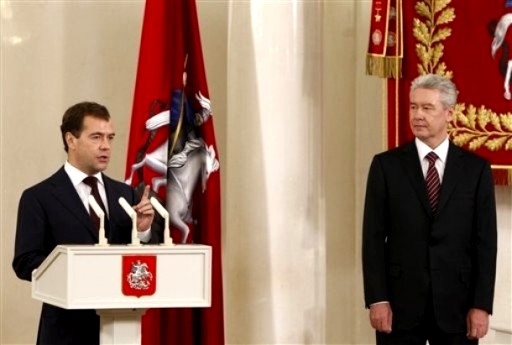
Russian President Dmitry Medvedev, left, delivers a speech while new Moscow Mayor Sergei Sobyanin listens to during an inauguration ceremony in Moscow, Thursday, Oct. 21, 2010. Prime Minister Vladimir Putin's chief of staff was named Thursday the Russian capital's new mayor in a move that would tighten federal control over Moscow's political scene and business interests. The appointment of Sergei Sobyanin underlined Putin's preeminence in Russian politics and would allow him to directly oversee Moscow's money flows that account for a sizable chunk of the nation's wealth. (AP Photo/Grigory Dukor, Pool)
A sources in the mayor’s office told Itar-Tass that the meeting to attend which prefects were also invited, will be visiting and will be held in the south of the city – at the Chertanovo district heating station.
Sobyanin devoted his first three days in office to the study approaches to solving one of the priorities set by President Dmitry Medvedev – the transport issue. The new mayor has already taken part in an enlarged meeting at the RF Transport Ministry on Moscow’s traffic jams, in which governor of the Moscow region Boris Gromov also took part. Sobyanin’ s first tour of construction sites on Saturday also focused on the traffic jams, exactly – search for ways to cope with. The new mayor intends to concentrate its resources for the settlement of this problem, at the same time he stressed that “it is inadmissible to “dissipate strength in the road construction work.” He intends to establish next year a special road fund, and several times increase the city budget spending on transport in 2011, since it “does not correspond to the scope of problems the city is facing.”
In the view of Sobyanin, at present the city “needs to concentrate efforts on several specific facilities as soon as possible.” He has inspected the supply lines in the area of the “island of skyscrapers” – a yet unfinished Moscow City business centre.
Sobyanin, who called its construction in the heart of Moscow “a mistake in the city development,” has admitted that there is no turning back now and it only remains to minimise the consequences of this mistake – especially for the efficient organisation of transport flows. In this regard, the mayor came to the conclusion on the results of Saturday’s meeting that the system of road junctions around the business centre needs considerable improvement.
At a meeting of the city government on Tuesday, which will also be the first for Sobyanin, the government members will consider the issue of Moscow’s electric power supply scheme for a period up to 2020. Sobyanin has already said that the issue of energy efficiency, including in the construction sphere, is also a priority. Starting next year the new mayor intends to take up the introduction of new construction standards in which “the energy saving share should be 20 to 30 percent.” The city’s housing and public utilities are rather acute, especially regarding the creation of management companies and homeowners’ associations.
Sobyanin instructed officials to work out by Monday specific measures to settle the problems with homeowners’ associations and demanded from prefects to “personally” deal with these problems, in order to relieve the city dwellers of them as early as by the middle of December.
In the view of the mayor, the campaign for the creation of homeowners’ associations in Moscow has already created a situation in which not citizens, but some organisations “that are cut off from the tenants” manage their houses. Therefore, officials were instructed to control in the future the relations of homeowners’ associations with the tenants, also the tariff policy and quality of provided services.
Sobyanin believes the housing and public utilities sphere in the RF capital is one of the most obscure corrupt. He has already warned the city officials about personnel reshuffles that may follow after “the first signal” about extortions in that or other departments. “Please listen to my words, in order not to regret in the future, I ask you to ensure control over your departments and institutions entrusted to you,” he told the officials. “Make sure that there are no extortions or some kind of informal payments.” “This must be ruled out either directly or through some sort of shady offices, agencies or expert bodies; decisions, also on personnel, will be made on the first signal,” the mayor said. He also gave an instruction to officials: “Keep that in mind, we can not assume that this work will be done by someone, it is you who should do this work in the first place.” “The better you do it, the better your performance will be assessed,” said Sobyanin.
The Moscow ministers have already been working in the status of “acting” for nearly a month. Sobyanin so far extended these powers of the city government until a new Cabinet is formed. The new mayor also thanked the ministers for their “fruitful” work with the “acting” prefix. However, he did not rule out “rotations” in the government and suggested giving maximum authority to local self-government bodies.
The Moscow City Duma last Thursday vested Sobyanin with the powers of the capital’s mayor. The candidate, proposed by the RF president, gained support from 32 legislators of the 35 having seats in city Duma (32 of the United Russia party and three from the Communist Party). Two ballots were cast against. The meeting was attended by 34 deputies. One Communist MP is away on a sick leave. Before the voting procedure the Communists said they would vote against Sobyanin. The voting was held by secret ballot.